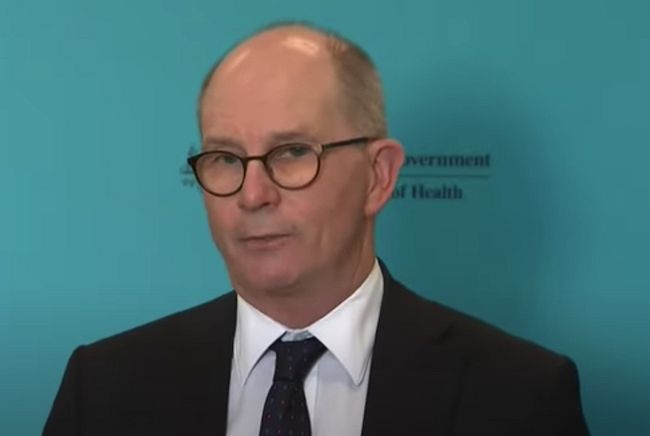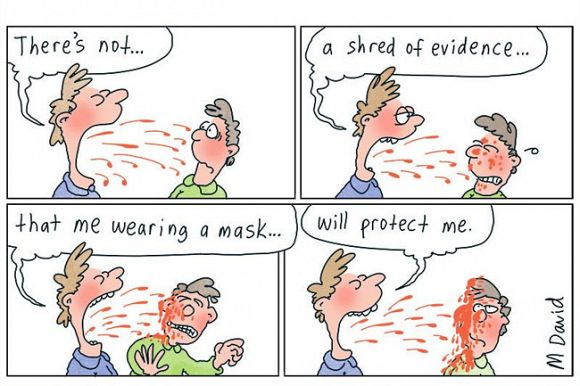After CMO Paul Kelly recently likened COVID deaths to "reaping", disabled woman Siobhan Simper says she feels let down and urges State and Federal Governments to reconsider their current approach to COVID.
AT THE Australian Medical Association (AMA) National Conference on Friday, Federal Chief Medical Officer (CMO) Paul Kelly fielded a question about COVID-19 deaths in Australia. In his answer, he pondered the meaning of the Grim Reaper, an anthropomorphic representation of death.
Kelly mused on the deaths that were prevented in Australia in the past two years by societal measures such as lockdowns, mask mandates, contact tracing and free and available PCR testing.
He then continued:
Since then, we have really had that... reaping [emphasis added]. I'm sorry to make... I'm in an audience of doctors so I think you understand what I'm saying here. It's the people that haven't died, in the last two years because we had no flu – because we largely did not have COVID and for various other reasons –who are now, unfortunately, in that difficult position of being high risk despite their high vaccination rate. And that is by far the majority of people who are dying.
Kelly is not wrong in stating that deaths from COVID-19 skew towards the elderly and other vulnerable groups. Of such deaths, 30% have been in residential aged care homes, the residents making up a mere 1.5% of the population. Over 60% of COVID-19 deaths are people over age 80 and 60% of deaths are from those not born in Australia.
Those in the most socioeconomically disadvantaged groups were three times more likely to die from COVID-19 than those in the most advantaged.
We do not have statistics on deaths in the disabled community, as the government does not keep a tally. But in the UK, disabled people have up to a 1.6 times greater chance of dying from COVID-19 than non-disabled people, due to the 'range of disadvantages experienced by disabled people’.
Where Kelly and I differ is the inevitably of such deaths. Rather than seeing the past two years of prevented infection, death and disease as some kind of debt to society which must be repaid, I see it as an opportunity to rejoice. All life is precious surely and every death prevented a cause for celebration.
As a disabled person, I often question the value society places on my life. When Tony Abbott gave a speech suggesting that elderly COVID-19 patients could be left to die, I told myself this was just an aberration. When Lieutenant Governor of Texas Dan Patrick claimed that grandparents should be willing to sacrifice themselves for the sake of the economy, I thought, surely not everyone thinks like this.
But it's hard to argue that sacrificing the vulnerable has become the predominant societal narrative when such a comment comes straight from the Federal CMO, the person whose advice directly influences federal government policy.
Both State and Federal Australian Governments have moved from a strategy of COVID-19 protection to a free-for-all.
Refusing to mandate masks and bring back work-from-home suggestions (against medical advice), tightening up the criteria for PCR testing and even attempting to remove the pandemic leave payment sends the message of complacence — we are content with the current situation and refuse to do anything to improve it.
Unfortunately, this leaves disabled, elderly, immunocompromised people and other at-risk groups on their own. A culture of individual responsibility will always place too great a burden on those already vulnerable.
For those who have been shielding, masking, testing and employing COVID safe procedures, there is no further individual action that can be taken which will adequately protect them from the risk of further disablement or death from COVID-19 infection.
The great irony of this laissez-faire approach to infection is that as more people contract COVID-19, the size of the at-risk group grows. This is because every infection has the chance of precipitating a pre-existing condition.
We know that COVID-19 infection can increase the risk of heart attack, stroke, diabetes and serious blood clots. This isn't even considering the 10-30% of people who will go on to develop long COVID, a devastating systemic condition similar to myalgic encephalomyelitis/chronic fatigue syndrome (ME/CFS) which can leave those affected unable to work, walk, or even get out of bed.
Even at a conservative prevalence rate of 5%, it is estimated up to 350,000 Australians will develop long COVID by the end of 2022. If we truly profess to care about the vulnerable in our society, our current approach to COVID must be reconsidered.
Measures such as mask mandates, improved ventilation and air filtration, greater vaccination and antiviral uptake supported by an expanded telehealth program, working from home, Government-funded pandemic leave and free personal protective equipment (PPE), rapid antigen tests (RATs), and support for struggling healthcare systems would repay themselves time and again in the economic and societal benefit of reduced infection.
Combine this with a tailored public health information campaign and we will not only be protecting lives from COVID but bolstering our economic system on which the pandemic has wreaked havoc.
Societies where wearing masks and other COVID protections are accepted and even embraced, show us that we can move from an individualistic approach to health to a culture of communal care.
I don't want to live in a society of creeping fatalism, where some lives are disposable — ready to be "reaped". I want to embrace the intrinsic value of every life, no matter how vulnerable and live in a society that does the same.
Siobhan Simper is a disabled psychology graduate living on Wadawurrung land. You can read more from her at chronicallysiobhan.wordpress.com.
 This work is licensed under a Creative Commons Attribution-NonCommercial-NoDerivs 3.0 Australia License
This work is licensed under a Creative Commons Attribution-NonCommercial-NoDerivs 3.0 Australia License
Support independent journalism Subscribe to IA.

Related Articles
- Absence of mandates means no end in sight for pandemic
- FLASHBACK 2021: Morrison's handling of COVID-19 a series of failures
- Labor leaves COVID-care up to individuals
- FLASHBACK 2021: The Liberal Government doesn't care if you die
- KERRYN PHELPS: COVID is not over!














